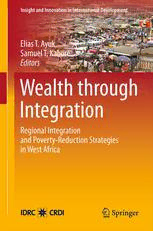Table Of ContentInsight and Innovation in International
Development
Edited by International Development Research Centre
Ottawa, Ontario, Canada
For furthervolumes:
http://www.springer.com/series/8850
Elias T. Ayuk (cid:129) Samuel T. Kabore´
Editors
Wealth Through Integration
Regional Integration and Poverty-Reduction
Strategies in West Africa
InternationalDevelopmentResearchCentre
Ottawa l Caire l Dakar l Montevideo l Nairobi l NewDelhi l Singapore
Editors
EliasT.Ayuk SamuelT.Kabore´
UnitedNationsUniversity UniversityofOuagadougou
InstituteforNatural BoulevardCharlesdeGaulle
ResourcesinAfrica Ouagadougou,BurkinaFaso
Accra,Ghana
OriginallypublishedinFrenchasAyuk,EliasT.andKabore´,SamuelT.(Re´d.),S’inte´grer
pours’enrichir,Springer,2012,ISBN978-1-4614-1233-5.
Acopublicationwiththe
InternationalDevelopmentResearchCentre
POBox8500
Ottawa,ON,CanadaK1G3H9
[email protected]/www.idrc.ca
ISBN978-1-55250-544-1(e-book)
ISBN978-1-4614-4414-5 ISBN978-1-4614-4415-2(eBook)
DOI10.1007/978-1-4614-4415-2
SpringerNewYorkHeidelbergDordrechtLondon
LibraryofCongressControlNumber:2012944175
#InternationalDevelopmentResearchCentre2013
Thisworkissubjecttocopyright.AllrightsarereservedbythePublisher,whetherthewholeorpartof
the material is concerned, specifically the rights of translation, reprinting, reuse of illustrations,
recitation,broadcasting,reproductiononmicrofilmsorinanyotherphysicalway,andtransmissionor
informationstorageandretrieval,electronicadaptation,computersoftware,orbysimilarordissimilar
methodologynowknownorhereafterdeveloped.Exemptedfromthislegalreservationarebriefexcerpts
inconnectionwithreviewsorscholarlyanalysisormaterialsuppliedspecificallyforthepurposeofbeing
enteredandexecutedonacomputersystem,forexclusiveusebythepurchaserofthework.Duplication
ofthispublicationorpartsthereofispermittedonlyundertheprovisionsoftheCopyrightLawofthe
Publisher’s location, in its current version, and permission for use must always be obtained from
Springer.PermissionsforusemaybeobtainedthroughRightsLinkattheCopyrightClearanceCenter.
ViolationsareliabletoprosecutionundertherespectiveCopyrightLaw.
The use of general descriptive names, registered names, trademarks, service marks, etc. in this
publicationdoesnotimply,evenintheabsenceofaspecificstatement,thatsuchnamesareexempt
fromtherelevantprotectivelawsandregulationsandthereforefreeforgeneraluse.
While the advice and information in this book are believed to be true and accurate at the date of
publication,neithertheauthorsnortheeditorsnorthepublishercanacceptanylegalresponsibilityfor
anyerrorsoromissionsthatmaybemade.Thepublishermakesnowarranty,expressorimplied,with
respecttothematerialcontainedherein.
Printedonacid-freepaper
SpringerispartofSpringerScience+BusinessMedia(www.springer.com)
Contents
1 Introduction:WhyIntegrate?. . . . . . . . . . . . . . . . . . . . . . . . . . . . . 1
EliasT.AyukandSamuelT.Kabore´
PartI EconomicConvergenceandFightingPoverty
2 FifteenYearsofWAEMU:ResultsandStrategies
fortheFuture. . . . . . . . . . . . . . . . . . . . . . . . . . . . . . . . . . . . . . . . . 19
DierySeck
3 GrowthandConvergenceinAfrica:ADynamic
PanelApproach. . . . . . . . . . . . . . . . . . . . . . . . . . . . . . . . . . . . . . . 43
PierreJoubertNguetseTegoum,PascalNakelse,andRolandNgwesse
4 HasThereBeenRealandStructuralConvergence
inWAEMUCountries?. . .. . . . . . . . . . . . . . .. . . . . . . . . . . . . .. . 69
NacissePalissyChassem
5 TheImpactoftheConvergence,StabilityandGrowth
PactintheWAEMU. . . . . . . . . . . . . . . . . . . . . . . . . . . . . . . . . . . . 91
AdamaCombeyandKomlaMally
6 RealConvergenceintheWAEMUArea:ABayesianAnalysis. . . . 111
ClaudeWettaandAntoineYerbanga
7 TheEffectsofCreditConstraintsonEconomicConvergence:
TheCaseoftheWAEMUCountries. . . . . . . . . . . . . . . . . . . . . . . . 131
AbdoulayeDiagneandAbdou-AzizNiang
8 FreeMovementofGoodsinWAEMUandtheEuropean
Union:CommunityLawaComparativeStudyfrom
thePerspectiveofTrade. . . . . . . . . . . . . . . . . . . . . . . . . . . . . . . . . 147
OusmaneBougouma
v
vi Contents
PartII RegionalFinancingInstrumentsandFightingPoverty
9 TheRoleofCashTransfersfromMigrantsinPromoting
theFinancingofEconomicDevelopment
inWAEMUCountries. . . . . . . . . . . . . . . . . . . . . . . . . . . . . . . . . . 171
AmethSaloumNdiaye
10 EfficiencyofCreditThatTargetsthePoor:Measures
andApplicationofAgriculturalCreditinBurkinaFaso. . . . . . . . . 189
SamuelTambiKabore´
11 PerformanceandEffectivenessoftheDecentralised
FinancialSystemandPovertyReductioninNiger. . . . . . . . . . . . . 211
InsaAbaryNoufou
12 FinancingAgricultureandtheFoodCrisisinAfrica:
WhatRoleCanMicrofinancePlay?. . . . . . . . . . . . . . . . . . . . . . . . 227
SandraKendo
13 CommonExternalTariff(CET)andTargeting
thePoorinMali. . . . . . . . . . . . . . . . . . . . . . . . . . . . . . . . . . . . . . . 247
MassaCoulibalyandBallaKeita
14 HowDoesCommunicationEnrichIntegrationPolicies. . . . . . . . . . 267
AhmedBarry,AugustinNiango,andKathrynToure´
15 ConclusionsandProspects:CreatingWealth
throughIntegration.. . . .. . . .. . . .. . . .. . . .. . .. . . .. . . .. . . .. 287
EliasT.AyukandSamuelT.Kabore´
Index. . . . . . . . . . . . . . . . . . . . . . . . . . . . . . . . . . . . . . . . . . . . . . . . . . . 295
Acknowledgements
Thechaptersfoundinthisbookresultfromaregional conferencethatwasjointly
funded by the Canadian International Development Agency (CIDA), the Interna-
tional Development Research Centre (IDRC) and the West Africa Economic and
MonetaryUnion(WAEMU).TheUniversityofOuagadougou’sInstitutSupe´rieur
des Sciences de la Population (ISSP), a WAEMU centre of excellence, organised
the conference in collaboration with the WAEMU Commission and the IDRC. A
scientific committee led the competitive selection process for papers, while an
organising committee handled organisational tasks. The members of these two
committees are listed below. The editors would like to express their sincere
gratitudetoallthesepeopleandinstitutionsfortheirvitalcontributions.
vii
About the Authors
Elias T. Ayuk is director of the United Nations University’ Institute for Natural
Resources in Africa (UNU-INRA) based in Accra, Ghana. At the time this work
was carried out, he was senior programme specialist at the regional office of the
InternationalDevelopmentResearchCentre(IDRC)inDakar,Senegal.
Newton Ahmed Barry is a specialised investigative journalist. After a decade
hostingtheeveningnewsonnationaltelevisioninBurkina,in2001,heco-founded
thenewspaperL’Eve´nement,oneofBurkinaFaso’swidelyreadnewspapers.
Ousmane Bougouma is a doctoral candidate at the University of Rouen and
UFR/SJP (Research and Training Centre in Law and Political Sciences) at the
University of Ouagadougou. He is also a part-time lecturer at the University of
Ouagadougou (responsible for tutorials) and an auditor with the CFA-Afrique
agency(alegalandfiscalconsultingagency).
NacisseP.T.Chassemisastatisticianandaneconomist.Heteacheseconometrics
attheInstituteforStatisticsandAppliedEconomics(ISSEA),locatedinYaounde´,
Cameroon.HeisalsoanadvisorattheCameroonMinistryofEconomy,Planning
andRegionalDevelopment.
Adama Combey is an economist at the Centre for study, research and training in
EconomicsandManagementoftheUniversityofLome´,Togo.
Massa Coulibaly is professor of econometrics and research methodology at the
University of Bamako. He is also a researcher at the Groupe de Recherche en
EconomieApplique´eetThe´orique(GREAT),ofwhichheisexecutivedirector.
Abdoulaye Diagne is a tenured professor at the Faculty of Economics and Man-
agementattheCheikhAntaDiopUniversity(UCAD)anddirectoroftheConsor-
tium pour la Recherche E´conomique et Sociale (CRES) in Dakar. He runs the
AfricadepartmentofthePovertyandEconomicPolicy(PEP)researchnetwork.
ix

